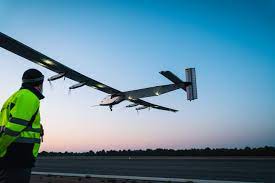No matter how technologically advanced the planes are today, they all have one limitation. Eventually, they have to land. Skydweller Aero, a U.S.-Spanish aerospace startup has the vision to break free from these constraints. They plan to do so by developing an autonomous solar-powered aircraft. The company says that it will eventually be capable of perpetual flight.
Investments for the solar-powered aircraft
This pitch helped the company raise $32 million in a Series A. Moreover, it has also led to an additional $8 million in oversubscribed funding led by Leonardo S.p.A, Marlinspike Capital, and Advection Growth Capital. The company has also entered into a partnership with Palantir Technologies. With this, they can use its Foundry analytics platform to process information at scale. And also onboard the aircraft designed for telecommunications, government operations, and emergency services.
Plantir is the best at creating value from your data, whether it’s putting data into their system to create operational insights for how we may fly our aircraft, putting data in to understand the sensing systems that are coming off of our aircraft, and what those might provide or to understand what’s coming through the networks in the aircraft.
Skydweller co-founder John Parkes.
Data – A By-Product
In this whole process, Skydweller will be generating a lot of data. The company’s focus is on three data-rich markets. These are telecommunications, geospatial intelligence, and government surveillance. The company plans to use the Foundry platform to help its customers.
The Foundry platform will also come in handy for route and mission planning. Because Skydweller intends to leverage weather and atmospheric information to ensure the aircraft can efficiently use the sun’s rays to stay in the air.
Weather and atmospheric data are especially important. This data will determine the altitude at which the aircraft flies. While the plane will be able to fly at high altitudes, the harder and more useful problem is to capture enough energy and use weather planning to stay at lower altitudes. Lower altitudes give better internet quality, geospatial data and provide more power for payload, he said.
“What it’s all about is creating a persistent aerial layer or pseudo satellite,” Parkes said. “We’re focused on building a perpetual flight aircraft. The goal is to create a plane that will fly forever, so long as the sun rises.”

Details of Skydweller’s tech
Swiss solar aircraft project dubbed Solar Impulse inspired Skydwellers tech. It was helmed by Bertrand Piccard and André Borschberg. The project operated for 14 years and invested $190 million into the solar-powered aircraft before the foundation behind it sold the intellectual property to Skydweller in 2019. The Solar Impulse was configured to be piloted aircraft. However, a lot of work since then has been to unman the platform and turn it into an ultra-long endurance aircraft, Parkes said.
The aircraft is all-electric, outfitted with 2,200-square-foot solar-panel wings, 600 kilograms of batteries, and a hydrogen fuel cell backup power system. The solar panels are not used to just maintain flight. They will also power systems for customers, like a geospatial camera system or payload from a telecom company.
The company’s using standard commercial aviation parts but most of them haven’t been tested beyond a certain number of hours of use. It is certainly less than the number of hours Skydweller plans to keep the aircraft in the air. Furthermore, like other planes built from emerging technologies, there isn’t a full certification framework already established for the vehicle



